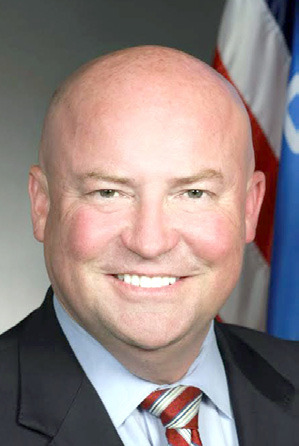FOR THE CHILDREN / From the desk of Joe Dorman
With National Voter Registration Day September 17, which was also Constitution Day, there was much excitement geared around ensuring people are able to cast a vote, not only in the upcoming General Election on November 5, but also for every subsequent election held. Unfortunately, Oklahoma’s voter turnout has been dismal the past several elections, ranking anywhere from 48th to 50th among states for percentage of voters submitting a ballot. Some might ask, “What does this have to do with child advocacy?” When advocates work through the different levels of government, the officials who have been selected by this minority of registered voters are the ones who are deciding the policies. I have been very fortunate to work with some great elected officials, often surprising me with just how solidly they have supported youth issues. One of the parts of my job at the Oklahoma Institute for Child Advocacy (OICA) that I most enjoy is getting to work with officials to shape solutions to benefit Oklahoma’s children. Many officials have truly stepped up in times of need to provide better opportunities for youth.
Voting has not always been accessible to all Americans. White, property- owning males were the first legal voters in our newly formed nation. Then, the 15th Amendment to the U.S. Constitution passed by Congress on February 26, 1869, and ratified by the states on February 3, 1870, granted Black American men the right to vote.
It took nearly 50 years, but Congress passed on June 4, 1919, and the states ratified on August 18, 1920, the 19th Amendment, granting women the right to vote. Then, on June 2, 1924, Congress enacted the Indian Citizenship Act, granting citizenship to all Indigenous Americans born in the U.S. The right to vote, however, was governed by state law. Until 1957, some states barred Indigenous Americans from voting.
The Voting Rights Act of 1965, extended in 1970, 1975, and 1982, abolished all remaining deterrents to exercising the right to vote and authorized federal supervision of voter registration where necessary. In 2013, the U.S. Supreme Court struck down a key provision of the act involving federal oversight of voting rules in nine states with histories of discrimination.
As 2024 is the 100th anniversary of federal voting rights for Indigenous Americans, OICA is working on a voter awareness project which will impact young Oklahomans. With permission from the Ben Harjo estate, we are using his “Warriors of Fire” print as the basis for a poster for each high school in Oklahoma, including the link for registering to vote online.
Ben was a personal friend and an avid voter, so his wife Barbara loved the idea of using this to encourage people to register. Thanks to generous support from the Cherokee Nation, we have the initial funding raised for the printing. If you would like to assist with this effort, you can go to oica.org to make a donation; for each $100 donated, the donor will receive a copy of the poster.
Addit iona l ly, OICA this week will kick off our “Chalk the Vote” efforts for educators in the upcoming General Election. We have gotten off to a late start with some staff changes in our office, so I am looking forward to announcing our new team members in a column soon.
I also want to note that on Monday, I celebrated my eighth anniversary working for OICA, and I was honored to attend the 94th birthday celebration of Melvin Moran on Saturday. We share September 18 as a birthday, but I am a few years behind him.
Happy birthday, Melvin!




